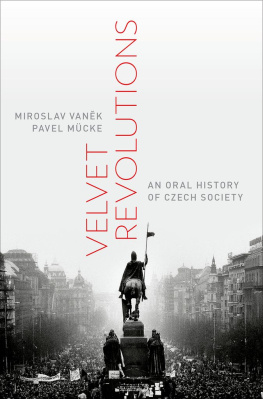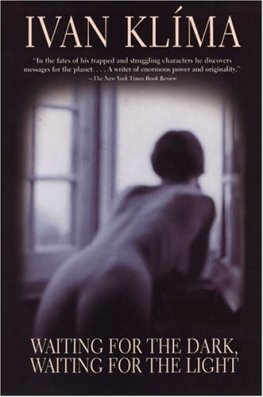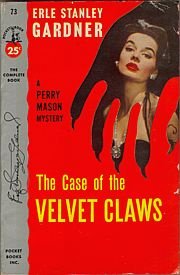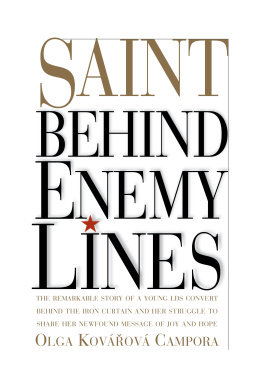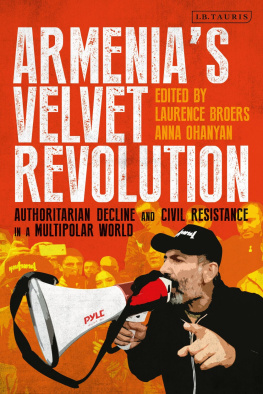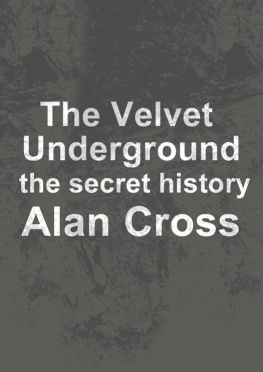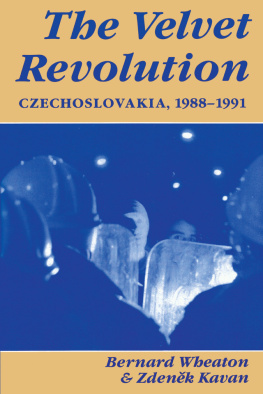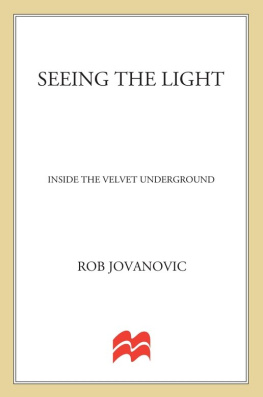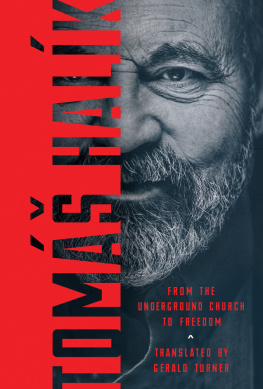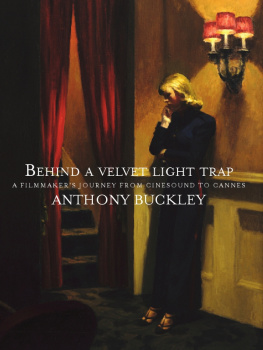Velvet Revolutions


Oxford University Press is a department of the University of Oxford. It furthers the Universitys objective of excellence in research, scholarship, and education by publishing worldwide.Oxford is a registered trade mark of Oxford University Press in the UK and certain other countries.
Published in the United States of America by Oxford University Press
198 Madison Avenue, New York, NY 10016, United States of America.
Oxford University Press 2016
All rights reserved. No part of this publication may be reproduced, stored in a retrieval system, or transmitted, in any form or by any means, without the prior permission in writing of Oxford University Press, or as expressly permitted by law, by license, or under terms agreed with the appropriate reproduction rights organization. Inquiries concerning reproduction outside the scope of the above should be sent to the Rights Department, Oxford University Press, at the address above.
You must not circulate this work in any other form and you must impose this same condition on any acquirer.
Cataloging-in-Publication Data is on file at the Library of Congress.
ISBN 9780199342723 (hbk.)
eISBN 9780199342747
This book was written with the grant support given to Miroslav Vank by the Grant Agency of the Czech Republic within the project Czech Society during the Normalization and Transformation Period: Biographical Narratives (project number P410/11/1352).
This book is dedicated to Ivana and Ondej and to Pavlna, Natlie, and Kristna
Contents


In a hotel in Denver, Colorado, during the forty-fifth annual conference of the Oral History Association (OHA), a new era in the development of Czech oral history began. The nearly two decades of its existence so far had been a very busy and one might even say turbulent period. Starting literally from scratch, it has gone on to achieve some remarkable results both at home and internationally. Dozens of books that use the oral history method have been published in Czech, and the discipline has been established in academia, in particular at the Institute for Contemporary History of the Czech Academy of Sciences since 2000; the Czech Association for Oral History was founded in 2007, and oral history is now taught in the Czech Republic in many humanities-oriented universities. Czech oral historians also work internationally, especially in the International Oral History Association (IOHA). One day, when the history of this umbrella organization of oral historians from all over the world is written, someone will perhaps wonder how it was possible that from 2012 to 2014, a small Central European country such as the Czech Republic occupied two seats on the executive council of the IOHA.
We do not remember exactly what the hotel served at our working breakfast on that October morning in 2011. However, what we do remember quite well is the excitement aroused in us by the proposal from the editors at Oxford University Press that we write a book based on the results of our research for a number of Czech oral history projects. As we were flying back home across the Atlantic, before we changed planes in Europe to take different directions either to Prague or to Aarhus in Denmark, still in a state of euphoria, we mused about all the people who had helped us have the opportunity to publish with one of the most prestigious publishing houses in the world.
If in hindsight we look for those key moments that most helped not only us personally but more importantly Czech oral history as a whole community of people and researchers get where it is today, we must definitely consider inspiration from abroad as fundamental: meetings and residencies in Durham in 2000, Chapel Hill in 2000 and 2004, Paris in 2003, Sydney in 2006, Guadalajara in 2008, Prague in 2010. The two semesters at the University of North Carolina in Chapel Hill and learning about our colleagues working methods in the Southern Oral History Program were key experiences that made us confident that Czech oral history had taken the right course. The conference in Durham, attended by Miroslav Vank, represented our first contact with oral history within the OHA; Pavel Mckes research stay in Paris led to the realization that the connection between oral history and memory research has great potential; in Sydney, Miroslav Vank established the very first contacts with oral history within the IOHA, and the idea of establishing a national association was born along with the desire to organize an IOHA conference in the Czech Republic. The fifteenth international IOHA conference in Guadalajara finally agreed on organizing the next conference in Prague. In 2010, the Czech capital hosted the largest conference to date of oral historians from all over the world.
The list of achievements and historic moments would be incomplete and indeed contrary to the very idea of oral history if alongside conferences and foreign stays we did not mention what we consider most important of all: the colleagues and friends who have helped us proceed on our way and are indeed still doing so. We should like to extend our thanks to Beth Millwood, Joseph Mosnier and James Leloudis, Donald A. Ritchie and Anne Ritchie, Paul Thompson, Alistair Thomson, Rob Perks, Ronald Grele, Charles T. Morrissey, Alexander von Plato, Alessandro Portelli, David K. Dunaway, Rina Benmayor, Alexander Freund, Todd Moye, Kathy Nasstrom, and Nancy Toff.
Along with our foreign colleagues, we should like to thank to all those who have been instrumental in shaping Czech oral history for the last two decades. It is certain that we would not be where we are today were it not for the long-term sustained support of Oldich Tma, director of the Institute for Contemporary History of the Czech Academy of Sciences (AV R) and other colleagues from all corners of the Czech Republic, in particular, Pavel Urbek, Ji Petr, Luk Vale, and Ji Vor, but also those who through all these years have passed through the Center for Oral History Research AV R: Jana Melicharov, Hana Peliknov, Jitka Sobotkov, Hana Zimmerhaklov, Petra Schindler-Wisten, Hana V. Bortlov, Lenka Krtk, and Ji Hlavek. Without the assistance of Jan Sokol, first dean of the Faculty of Humanities, we should not have been able to establish oral history as an independent field of masters degree studies in one of the faculties of Charles University in Prague.
The book itself owes a lot to all those with whom we were able to discuss our dilemmas, especially Michal Pullmann, Pavel Urbek, Martin Franc, Radek Diestler, Rosamund Johnston, Veronika Pehe, Lenka Krtk, Ji Hlavek, and Petra Schindler-Wisten.
Our special thanks go to Tom Admek and his colleagues James F. Cool and David R. Beveridge, who translated our Czech manuscript into academic English. Not only did they do an excellent job as translators, but we also accepted their advice regarding some parts of the individual chapters. We should also like to thank Lenka Krtk, who edited the complete manuscript with her usual care so that we could pass it on to the Oxford University Press. Then we must not forget to give thanks to Jindich treit, the photographer whose photos emanating an unforgettable atmosphere accompany the text.

